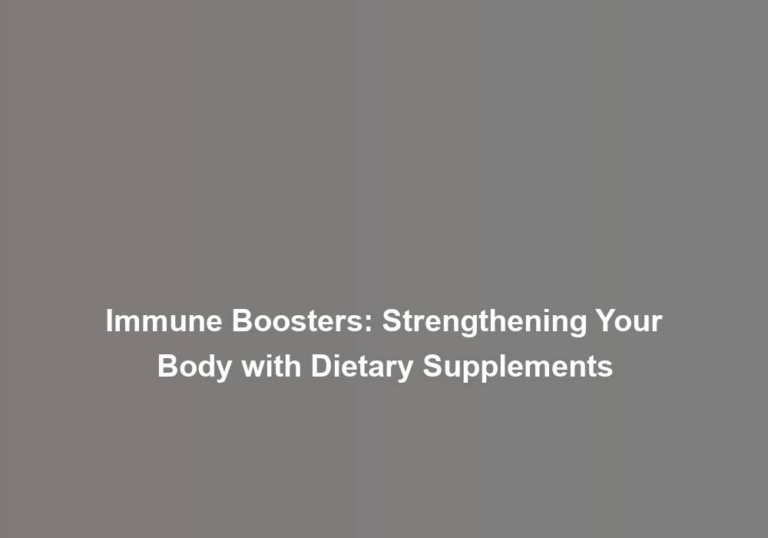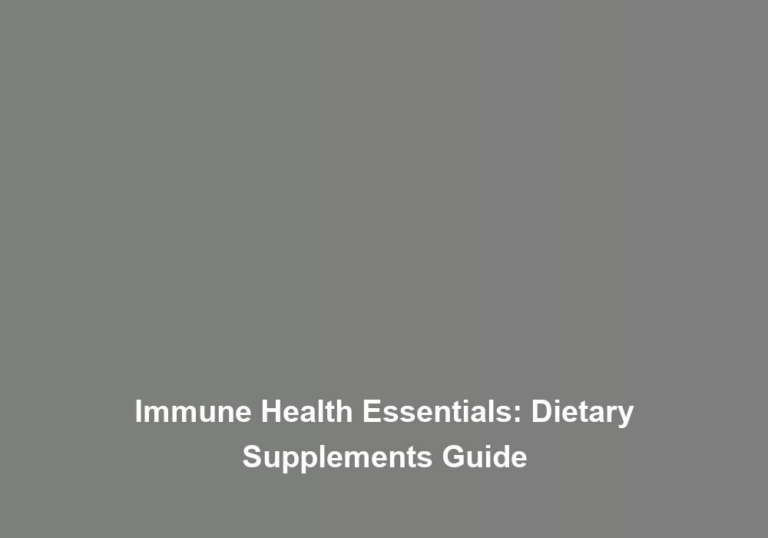Boosting Immunity with Zinc: Your Guide
You may not realize it, but zinc plays a crucial role in supporting your immune system. In fact, studies have shown that zinc deficiency affects an estimated 2 billion people worldwide. But donG??t worry, thereG??s a lot more to understand about how zinc can help bolster your immune function and overall health. So, letG??s explore the science and practical tips for incorporating zinc into your daily routine to support your immune system.
The Importance of Zinc for Immunity
Boost your immune system with zinc, a crucial mineral that plays a vital role in supporting your bodyG??s natural defense mechanisms. Zinc is essential for a well-functioning immune system as it is involved in the development and function of immune cells. Research has shown that zinc supplementation can enhance immune response, helping your body fight off infections more effectively. Zinc deficiency, on the other hand, can lead to a weakened immune system, making you more susceptible to illness.
When you have an adequate level of zinc in your body, it helps regulate the function of various immune cells, including neutrophils, natural killer cells, and T-lymphocytes. These cells play a crucial role in identifying and destroying pathogens, such as bacteria and viruses, that can cause illness. Additionally, zinc is involved in the production of antibodies, which are essential for recognizing and neutralizing harmful substances in the body.
Studies have also shown that zinc supplementation can reduce the duration and severity of the common cold, demonstrating its ability to support the bodyG??s immune response. Furthermore, zinc plays a role in reducing inflammation, which is an important aspect of the immune systemG??s response to infections and injuries.
Incorporating zinc-rich foods, such as oysters, beef, chickpeas, and pumpkin seeds, into your diet can help ensure that you maintain adequate zinc levels to support your immune system. If needed, zinc supplements can also be used to address a deficiency and bolster immune function. Prioritizing zinc intake is a practical way to strengthen your bodyG??s natural defenses and reduce susceptibility to illness.
Understanding ZincG??s Role in Immune Function
Understanding the role of zinc in immune function is crucial for maintaining a healthy and robust defense against infections and illnesses. HereG??s what you need to know:
-
Zinc Absorption: Zinc is absorbed in the small intestine, and its absorption can be influenced by various factors such as phytates (found in whole grains and legumes) and high dietary fiber intake. Consuming zinc-rich foods and ensuring a balanced diet can optimize zinc absorption.
-
Immune Response: Zinc plays a vital role in the immune response by influencing the function of immune cells. It is involved in the development and function of neutrophils, natural killer cells, and macrophages, which are crucial for combating infections. Additionally, zinc is involved in the production of antibodies and helps regulate inflammation.
-
Zinc Deficiency: A deficiency in zinc can lead to impaired immune function. It may result in an increased susceptibility to infections and a prolonged recovery time from illnesses. Common symptoms of zinc deficiency include frequent infections, slow wound healing, and poor growth in children.
-
Immune Function: Adequate zinc levels are essential for maintaining optimal immune function. Ensuring that your body has an adequate supply of zinc through a balanced diet or supplementation, if necessary, can help support a healthy immune system and overall well-being.
Understanding how zinc influences immune function and taking steps to optimize zinc levels can significantly contribute to bolstering your bodyG??s defense against infections.
Top Zinc-Rich Foods to Boost Immunity
Incorporating zinc-rich foods into your diet can be a practical and effective way to support your immune system and enhance overall health. Zinc is a vital mineral that plays a crucial role in immune function, wound healing, and metabolism. To help you boost your zinc intake, here are some top zinc-rich foods that you can easily incorporate into your meals:
| Food | Zinc Content (per 100g) | Serving Ideas |
|---|---|---|
| Pumpkin Seeds | 7.64mg | Sprinkle over salads or blend into smoothies |
| Chickpeas | 2.59mg | Use in soups, stews, or roast for a crunchy snack |
| Yogurt | 1.59mg | Enjoy as a snack or incorporate into smoothies |
In addition to these foods, incorporating zinc-rich recipes into your meal planning can be an enjoyable way to ensure youG??re getting enough of this essential mineral. Consider trying out dishes like pumpkin seed pesto pasta or chickpea and vegetable stew for a delicious and nutritious boost of zinc.
Another creative way to increase your zinc intake is by preparing immune-boosting smoothies. Blend together yogurt, pumpkin seeds, and other zinc-rich ingredients with fruits and vegetables to create a tasty and nutrient-packed smoothie that supports your immune system.
How Zinc Supports Immune System Health
Zinc plays a critical role in supporting the health and function of your immune system, aiding in the bodyG??s ability to defend against infections and illnesses. HereG??s how zinc supports your immune system health:
-
Immune Cell Function: Zinc is essential for the development and function of many immune cells, including neutrophils, natural killer cells, and macrophages. These cells play a crucial role in identifying and eliminating pathogens, thus supporting your bodyG??s immune response.
-
Inflammation Regulation: Zinc helps regulate the immune systemG??s inflammatory response. By doing so, it ensures that inflammation is balanced and appropriate, preventing excessive inflammation that can lead to tissue damage.
-
Antioxidant Defense: Zinc is involved in the production of antioxidant enzymes, which protect your body from oxidative stress. This is important for maintaining a healthy immune system, as oxidative stress can impair immune function.
-
Zinc Supplementation: In cases where zinc intake is inadequate through diet alone, supplementation can help support immune system health. However, itG??s crucial to consult with a healthcare professional before starting any supplementation to determine the appropriate dosage for your individual needs.
Ensuring that you have adequate zinc levels through a balanced diet or supplementation, if necessary, can help support a robust immune system, enabling your body to effectively combat pathogens and maintain overall health.
Optimizing Immunity Through Zinc Supplementation
If youG??re looking to optimize your immune system through zinc supplementation, itG??s important to understand the immune benefits of zinc and the recommended daily intake for maintaining immune health. By ensuring you meet the recommended daily intake of zinc, you can support your immune systemG??s ability to function optimally. LetG??s explore the key points surrounding zincG??s immune-boosting potential and how you can incorporate it into your daily routine for overall immune health.
ZincG??s Immune Benefits
To optimize your immune system through supplementation, consider the beneficial effects of zinc on immunity. Zinc supplementation can enhance your immune response in several ways:
-
Immune Cell Function: Zinc plays a crucial role in the development and function of immune cells, such as neutrophils, natural killer cells, and T-cells, which are essential for fighting off infections.
-
Inflammation Regulation: Zinc helps regulate the inflammatory response in the body, promoting a balanced immune reaction to pathogens and reducing the risk of chronic inflammation.
-
Antioxidant Activity: Zinc acts as an antioxidant, protecting immune cells from oxidative stress and supporting their ability to combat harmful pathogens.
-
Barrier Function: Zinc contributes to the maintenance of the skin and mucosal barriers, which act as the bodyG??s first line of defense against invading pathogens.
These immune benefits of zinc highlight its importance in supporting overall immune health.
Recommended Daily Intake
When considering the recommended daily intake for optimizing immunity through zinc supplementation, it is important to be mindful of the varying needs based on age, gender, and individual health status. For adults, the recommended dietary allowance (RDA) for zinc is 11 mg for males and 8 mg for females. However, during pregnancy and lactation, women may require higher amounts. ItG??s important to note that the use of zinc supplements should be approached with caution, as excessive intake can have adverse effects on immune function and overall health. ItG??s generally best to obtain nutrients from a balanced diet, and there are plenty of zinc-rich foods such as oysters, beef, chickpeas, and pumpkin seeds. Before considering zinc supplements, itG??s advisable to consult with a healthcare professional to assess individual needs and potential interactions with other medications.
Zinc Dosage and Safety Considerations for Immune Health
Consider incorporating zinc into your daily routine to support your immune health, with recommended dosages and safety considerations in mind. Zinc supplementation can be beneficial for your immune system, but itG??s important to be mindful of the proper dosage and potential side effects. HereG??s what you need to know:
-
Recommended Dosage: The recommended daily intake of zinc for adults is 8-11 mg for women and 11 mg for men. However, when aiming to support immune health, slightly higher doses may be beneficial. ItG??s generally safe for adults to take up to 40 mg of zinc per day, but exceeding this limit can lead to adverse effects.
-
Potential Side Effects: While zinc is essential for immune function, taking too much can actually impair immune responses and lead to adverse effects such as nausea, vomiting, diarrhea, and a metallic taste in the mouth. Long-term excessive intake of zinc can also interfere with the absorption of other essential minerals.
-
Forms of Zinc: Zinc supplements come in various forms, including zinc acetate, zinc gluconate, zinc sulfate, and zinc orotate. Each form has different concentrations of elemental zinc, so itG??s important to read labels carefully and follow dosing instructions.
-
Safety Considerations: ItG??s crucial to consult with a healthcare professional before starting any new supplement regimen, especially if you have any underlying health conditions or are taking medications. Additionally, be cautious about combining zinc supplements with other immune-boosting products, as this could lead to excessive zinc intake.
Conclusion
So, now you know the power of zinc in boosting your immune system. With the right foods and supplements, you can give your body the support it needs to stay healthy and strong. Just like a shield, zinc acts as a protective barrier for your immune system, helping to fend off illness and keep you feeling your best. Keep up the zinc intake, and keep your immunity in top shape.







